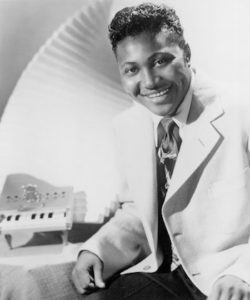| Rhythm and Blues |
| Amos Milburn / Rhythm and Blues |
| 24.01.2023 - 12:26 |
Amos Milburn Born Joseph Milburn, 1 April 1927, Houston, Texas Died 3 January 1980, Houston, Texas  Nick Tosches has called Amos Milburn "the first great rock n roll piano man". It is true that Milburn was a crucial figure in the trans- formation of jump blues into R&B and rock 'n' roll. Fats Domino, Little Richard and Jerry Lee Lewis have all cited Amos as a seminal influence on their work. Ironically, Milburn would be swept aside by the very idiom that he had helped create. Milburn picked up his style from a rich variety of sources : the boogie woogie piano of Albert Ammons and Pete Johnson, the blasting big bands of Lionel Hampton and Buddy Johnson, and as a contrast, the silky smooth after-hours cocktail blues of Charles Brown, Nat "King" Cole and Ivory Joe Hunter. But the result was pure Amos Milburn. Born into a family of thirteen children, he taught himself to play piano at age five. While only fifteen, he joined the Navy in November 1942 (lying about his age) and served three years in the Pacific, mainly as a cook. Upon his discharge he returned to Houston where he formed a six-man band with old school friends. He secured bookings as far afield as San Antonio where he was discovered by Lola Ann Cullum, the wife of a Houston dentist, who became his manager. Together they wrote "After Midnite" and "Chicken Shack Boogie" and headed to Los Angeles with the demos, in search of a recording contract. They were turned down by Jules Bihari of Modern Records, but got lucky at Aladdin Records. Legend has it that Aladdin boss Eddie Mesner was hospitalized at the time, but that did not deter Lola Ann Cullum from playing the demos at his hospital bedside. Amos was signed up swiftly and had his first recording session on September 12, 1946. "After Midnite" became the first single, soon followed by "My Baby's Boogying", "Down the Road Apiece" and the instrumental "Amos' Boogie", all from that first session. Strangely, he did not record "Chicken Shack Boogie" until November 1947. By that time his arranger was saxopohonist Maxwell Davis, with whom Amos developed a strong bond. "Being young, I didn't have any experience in arranging for a band, but I could tell him how I wanted it and Maxwell put it on paper". "Chicken Shack Boogie" was finally released in October 1948 and not only did this boogie woogie-styled song become his first hit - it would be the biggest hit of his career, spending five weeks at # 1. (All chart positions here are R&B, Milburn never had a pop hit.) As a result of this success, Amos was now billed as "The Chicken Shack Boogie Man", while his group became known as "The Aladdin Chickenshackers". It was the start of an extremely successful period for Milburn, with nineteen Top 10 hits between 1948 and 1954. In 1949 and 1950 he was voted Top R&B artist by Billboard. The follow-up to "Chicken Shack Boogie" was "Bewildered", another number one, but a total contrast, being a slow blues ballad in Charles Brown's style. Later # 1 hits were "Roomin' House Boogie" (1949) and "Bad Bad Whiskey" (late 1950). The latter song initiated a series of booze-related songs, including "Thinking And Drinking" (# 8), "Let Me Go Home Whiskey" (# 3, written by John 'Shifty' Henry, a bassist saluted by Leiber and Stoller in "Jailhouse Rock"), "One Scotch, One Bourbon, One Beer" (# 2) and his last hit, "Good Good Whiskey" (# 5). Milburn practiced what he preached : he was a heavy drinker. And he started drinking even more after his records stopped selling. Rock n roll was emerging and suddenly his music was deemed old-fashioned by the fickle record buying public. In 1954 Amos was forced to disband his road band of seven years. He tried hard to adjust to the new sounds. Aladdin sent him to New Orleans in 1956-57 in an attempt to reach Fats Domino's young white fans. A torrid remake of "Chicken Shack Boogie", recorded in September 1956, must rank as one of the greatest black rock n roll records ever, but it failed to sell. Later attempts fared no better and in 1957 Aladdin did not renew his contract, after having released more than 50 singles by Milburn over an 11-year period. In 1959 he recorded one single for Ace Records with his good friend Charles Brown, who also accompanied him to the King label in 1960- 1961. A contract with Motown in 1962 resulted in an LP ("Return Of the Blues Boss") and two singles, but no sales. He moved to Cleveland, Ohio, and continued to perform until 1969, when he had his first stroke. A second stroke in 1970 turned him into an invalid. He quit drinking and returned to Houston. In 1976 he made one last album, re-recording some of his biggest hits for Johnny Otis's Blues Spectrum label. As the left half of his body was paralyzed, he could only play piano with his right hand ; Johnny Otis played the left hand. In 1979, his declining health necessitated the amputation of a leg. Less than six months later, Amos Milburn passed away, aged only 52. He was inducted into the Blues Hall Of Fame in 2010. |
rockintheblues |
gedruckt am 25.04.2024 - 15:21 |
| http://rockintheblues.net/include.php?path=content&contentid=95 |